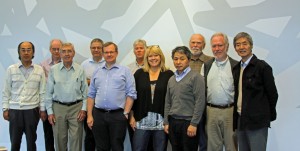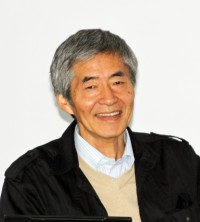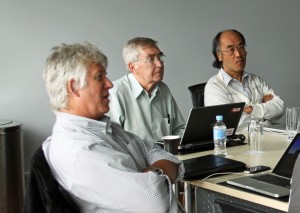
The GDE Executive Committee at their face-to-face meeting in Melbourne. From the left, Toshiaki Tauchi, Gerry Dugan, Ewan Paterson, Nick Walker, Brian Foster, Mike Harrison, Maxine Hronek, Akira Yamamoto, Barry Barish, Mark Ross and Kaoru Yokoya. Steinar Stapnes was absent.
The GDE Executive Committee met in a two-day face-to-face meeting in Melbourne just following ICHEP12. The main order of business was to develop a detailed “game plan” for producing the ILC Technical Design Report.
The Global Design Effort (GDE) was created by the International Committee for Future Accelerators (ICFA) and its subcommittee, the International Linear Collider Steering Committee (ILCSC) to globally coordinate the worldwide R&D and design effort for a 0.5-TeV linear electron-positron collider based on superconducting radiofrequency (RF) technology. This followed a decision by ICFA to base the design of this companion machine for the LHC on superconducting RF technology, rather than the more conventional room-temperature technology. The culmination of that work is an R&D programme that has demonstrated that the crucial technologies can meet the ILC performance requirements, and has produced a realistic design for realising such a global machine. The final deliverable for the GDE is a Technical Design Report (TDR) that summarises both the R&D accomplishments and presents a proposed design for the ILC.

Kaoru Yokoya happily reporting to the EC on plans for a public unveiling of the TDR in Tokyo in December.
The baseline for the ILC technical design was established last winter and all the resulting smaller technical decisions were made by the end of spring. Now it is the task of the GDE to document that design and also to make a report on the R&D accomplishments and future plans. Our plan is to produce a standalone two-volume accelerator report, one volume on the R&D programme and the other on the accelerator design. By standalone we mean that it will cover the entire programme with direct references to the backup materials on the Electronic Data Management System (EDMS) that has been developed for the GDE. There will be companion volumes on the physics and detectors, making a complete package that can be used as the basis for proposals to governments for a linear collider project.
The R&D volume will be an update of the interim R&D report that we produced last year. It will also address the ongoing and proposed future ILC R&D programme. The ILC accelerator design volume will present the design that has evolved since we produced the ILC Reference Design Report (RDR). The schedule is to complete both volumes of the TDR in advanced draft form to submit to the Project Advisory Committee (PAC) for their meeting on 13 and 14 December 2012 at KEK, where an augmented committee will begin the technical review process. In association with that meeting, there will be a public event in Tokyo immediately following the PAC meeting. An international cost review is also planned for the end of January and a report to the ILCSC in Vancouver on the TDR reviews and status in February 2013. Revisions from those reviews will be incorporated into the final versions of the TDR, which will be officially submitted to the ICFA at the Lepton Photon 2013 conference in San Francisco in June 2013.
John Carwardine is coordinating the effort to produce the TDR. A detailed outline, including page counts, has been agreed to and author responsibilities have been assigned for each section. The draft sections will then go through an editing process. Finally, each section will undergo a review by the GDE Executive Committee, where we have assigned two reviewers for each section and have already begun the review process on the early drafts that have been submitted. By having the EC participate in an ongoing review process, as the sections become refined, the final approval by the EC should be expedited. The EC will have a one-day face-to-face meeting in November to go over the final referee reports before approving the version that will be submitted to the PAC.



Recent Comments